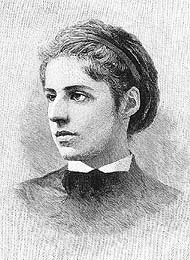| Emma Lazarus  Born: 22-Jul-1849 Born: 22-Jul-1849
Birthplace: New York City
Died: 19-Nov-1887
Location of death: New York City
Cause of death: Cancer - unspecified
Remains: Buried, Beth Olom Cemetery, Queens, NY
Gender: Female
Religion: Jewish
Race or Ethnicity: White
Occupation: Poet Nationality: United States
Executive summary: The New Colossus Emma Lazarus was an American Jewish poet, born in New York. She is perhaps best known for a single verse from her poem The New Colossus (1883), appearing on Bartholdi's Statue of Liberty in New York City:
Give me your tired, your poor,
Your huddled masses, yearning to breathe free,
Send these, the homeless, tempest-tost to me,
I lift my lamp beside the golden door!"
When the Civil War broke out Lazarus was inspired to lyric expression. Her first book (1867) included poems and translations which she wrote between the ages of fourteen and seventeen. As yet her models were classic and romantic. At the age of twenty-one she published Admetus and other Poems (1871). Admetus is inscribed to Ralph Waldo Emerson, who greatly influenced her, and with whom she maintained a regular correspondence for several years. She led a retired life, and had a modest conception of her own powers. Much of her next work appeared in Lippincott's Magazine, but in 1874 she published a prose romance (Alide) based on Goethe's autobiography, and received a generous letter of admiration from Ivan Turgenev. Two years later she visited Concord and made the acquaintance of the Emerson circle, and while there read the proof sheets of her tragedy The Spagnoletto. In 1881 she published her excellent translations of Heine's poems. Meanwhile events were occurring which appealed to her Jewish sympathies and gave a new turn to her feeling. The Russian massacres of 1880-81 were a trumpet call to her. So far her Judaism had been latent. She belonged to the oldest Jewish congregation of New York, but she had not for some years taken a personal part in the observances of the synagogue. But from this time she took up the cause of her race, and "her verse rang out as it had never rung before, a clarion note, calling a people to heroic action and unity; to the consciousness and fulfilment of a grand destiny." Her poems, "The Crowing of the Red Cock" and "The Banner of the Jew" (1882) stirred the Jewish consciousness and helped to produce the new Zionism. She now wrote another drama, the Dance to Death, the scene of which is laid in Nordhausen in the 14th century; it is based on the accusation brought against the Jews of poisoning the wells and thus causing the Black Death. The Dance to Death was included (with some translations of medieval Hebrew poems) in Songs of a Semite (1882), which she dedicated to George Eliot. In 1885 she visited Europe. She devoted much of the short remainder of her life to the cause of Jewish nationalism. In 1887 appeared By the waters of Babylon, which consists of a series of "prose poems", full of prophetic fire. She died in New York on the 19th of November 1887.Father: Moses Lazarus (sugar merchant, d. Mar-1885)
Mother: Esther Nathan
Sister: Josephine
Sister: Mary
Sister: Annie
Author of books:
Poems and Translations, Written Between the Ages of Fourteen and Sixteen (1866, poetry)
Admetus and Other Poems (1871, poetry)
Alide, An Episode in Goethe's life (1874, novel)
The Spagnoletto (1876, poetry)
Poems and Ballads of Heinrich Heine (1881, poetry, translation)
Songs of a Semite, The Dance to Death and Other Poems (1882, poetry)
Poems of Emma Lazarus (1888, poetry, posthumous)
Do you know something we don't?
Submit a correction or make a comment about this profile
Copyright ©2019 Soylent Communications
|